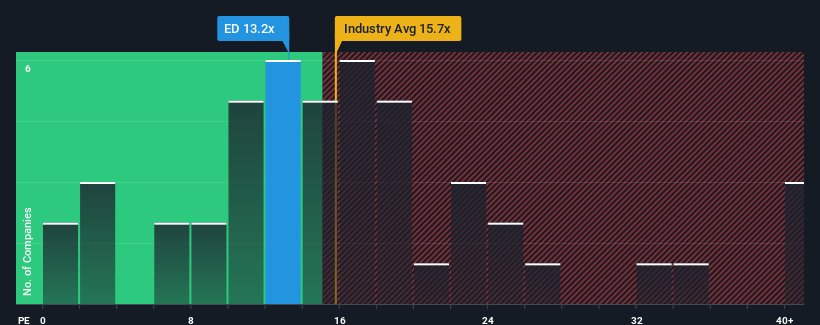- United States
- /
- Other Utilities
- /
- NYSE:ED
The Market Doesn't Like What It Sees From Consolidated Edison, Inc.'s (NYSE:ED) Earnings Yet

With a price-to-earnings (or "P/E") ratio of 13.2x Consolidated Edison, Inc. (NYSE:ED) may be sending bullish signals at the moment, given that almost half of all companies in the United States have P/E ratios greater than 17x and even P/E's higher than 33x are not unusual. Nonetheless, we'd need to dig a little deeper to determine if there is a rational basis for the reduced P/E.
Recent times have been pleasing for Consolidated Edison as its earnings have risen in spite of the market's earnings going into reverse. It might be that many expect the strong earnings performance to degrade substantially, possibly more than the market, which has repressed the P/E. If not, then existing shareholders have reason to be quite optimistic about the future direction of the share price.
See our latest analysis for Consolidated Edison

Is There Any Growth For Consolidated Edison?
There's an inherent assumption that a company should underperform the market for P/E ratios like Consolidated Edison's to be considered reasonable.
Taking a look back first, we see that the company grew earnings per share by an impressive 42% last year. The latest three year period has also seen an excellent 70% overall rise in EPS, aided by its short-term performance. Therefore, it's fair to say the earnings growth recently has been superb for the company.
Shifting to the future, estimates from the ten analysts covering the company suggest earnings growth is heading into negative territory, declining 4.7% per year over the next three years. That's not great when the rest of the market is expected to grow by 13% per year.
With this information, we are not surprised that Consolidated Edison is trading at a P/E lower than the market. Nonetheless, there's no guarantee the P/E has reached a floor yet with earnings going in reverse. There's potential for the P/E to fall to even lower levels if the company doesn't improve its profitability.
The Key Takeaway
Generally, our preference is to limit the use of the price-to-earnings ratio to establishing what the market thinks about the overall health of a company.
We've established that Consolidated Edison maintains its low P/E on the weakness of its forecast for sliding earnings, as expected. At this stage investors feel the potential for an improvement in earnings isn't great enough to justify a higher P/E ratio. Unless these conditions improve, they will continue to form a barrier for the share price around these levels.
Before you take the next step, you should know about the 4 warning signs for Consolidated Edison (2 don't sit too well with us!) that we have uncovered.
You might be able to find a better investment than Consolidated Edison. If you want a selection of possible candidates, check out this free list of interesting companies that trade on a low P/E (but have proven they can grow earnings).
New: AI Stock Screener & Alerts
Our new AI Stock Screener scans the market every day to uncover opportunities.
• Dividend Powerhouses (3%+ Yield)
• Undervalued Small Caps with Insider Buying
• High growth Tech and AI Companies
Or build your own from over 50 metrics.
Have feedback on this article? Concerned about the content? Get in touch with us directly. Alternatively, email editorial-team (at) simplywallst.com.
This article by Simply Wall St is general in nature. We provide commentary based on historical data and analyst forecasts only using an unbiased methodology and our articles are not intended to be financial advice. It does not constitute a recommendation to buy or sell any stock, and does not take account of your objectives, or your financial situation. We aim to bring you long-term focused analysis driven by fundamental data. Note that our analysis may not factor in the latest price-sensitive company announcements or qualitative material. Simply Wall St has no position in any stocks mentioned.
About NYSE:ED
Consolidated Edison
Through its subsidiaries, engages in the regulated electric, gas, and steam delivery businesses in the United States.
Average dividend payer and fair value.


